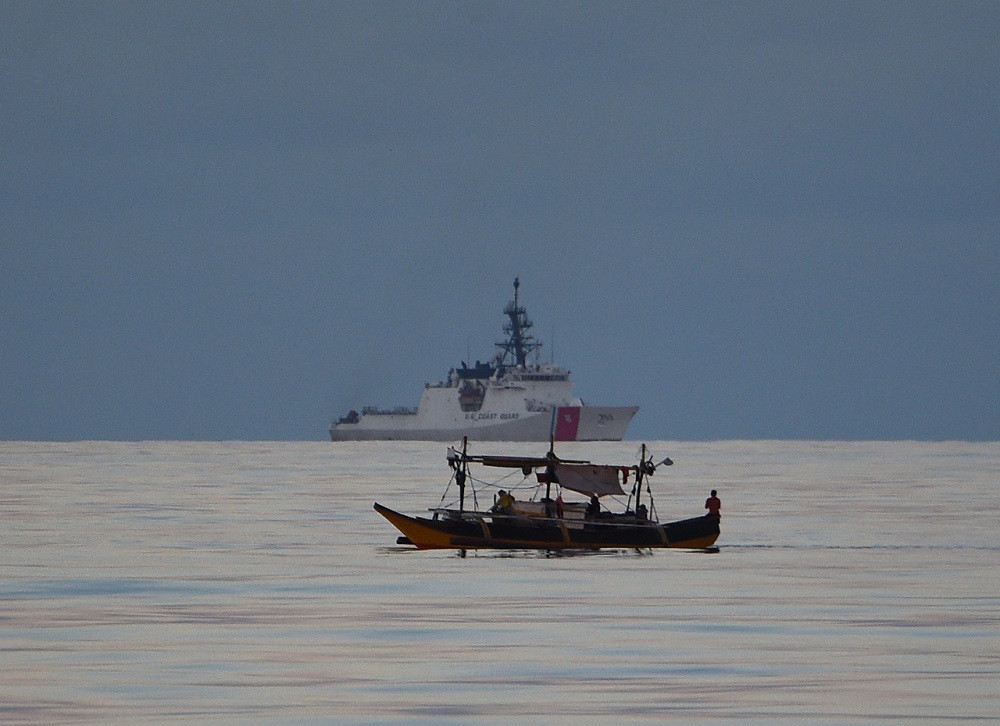Popular Reads
Top Results
Can't find what you're looking for?
View all search resultsPopular Reads
Top Results
Can't find what you're looking for?
View all search resultsASEAN, China looking to restart talks on South China Sea
RI protests China’s forays into waters under economic jurisdiction
Change text size
Gift Premium Articles
to Anyone
A
fter more than a year without progress, ASEAN and China are looking into meeting again in person to continue negotiations for a Code of Conduct (COC) on the South China Sea, which is hoped to be concluded this year.
ASEAN foreign ministers met online last week to discuss various regional matters including progress on the COC – a requirement from the 2002 Declaration on the Conduct of Parties (DOC) in the South China Sea that remains elusive nearly two decades later.
Officials from both sides were looking at the possibility of having their negotiators meet in person, as opposed to engaging virtually, which has become the new norm under the COVID-19 pandemic, said Sidharto Suryodipuro, the Foreign Ministry’s director general for ASEAN affairs.
“There’s an urgency to continue the talks because of the delays in the past year,” he told The Jakarta Post over the weekend.
The COC underpins efforts to prevent all-out conflict among South China Sea claimants, who are locked in overlapping territorial disputes in the busy trade route.
China has made sweeping yet illegal claims over much of the sea, including in areas also claimed by Vietnam, the Philippines, Brunei, Malaysia and Taiwan. Indonesia, while not a claimant itself, has protested against China’s forays into waters under its economic jurisdiction.
In late 2018, Chinese Premier Li Keqiang proposed a timeline of three years to conclude the COC talks, after the two sides agreed to work on a single negotiated draft text after years of political impasse.
The first reading of the draft codex was concluded ahead of schedule in July 2019, but the second reading never took place due to the onset of pandemic travel curbs and health protocols that kept negotiations from progressing.
The year 2021 was supposed to be the year negotiators begin their third and final reading of the negotiation text.
ASEAN ministers, however, are still hopeful for an early conclusion of an “effective and substantive” COC, amid minimal progress and growing tensions on the ground.
“We appreciated efforts undertaken to continue the second reading of the Single Draft COC Negotiating Text in spite of the evolving pandemic situation,” the ministers said, according to an ASEAN chairman's statement by Brunei.
Top diplomats from Vietnam and the Philippines, who are among the countries that border the resource-rich and strategic South China Sea, have reiterated calls for an effective and efficient COC that is in line with international law, including the 1982 United Nations Convention on the Law of the Sea (UNCLOS).
Beijing, having rejected a 2016 international tribunal ruling that invalidated its claims, chose to build up a military presence in the waters and pick apart regional consensus.
Disagreements remain between ASEAN and China on the details of the COC, including whether to make it legally binding and whether its application would be limited.
“The Philippines will press harder for the completion of a second reading of the negotiated text for a COC,” the Philippines’ Foreign Affairs Secretary Teodoro L. Locsin Jr. said in a statement.
The call to continue negotiations comes as the standing committee of China’s National People’s Congress passed a new law on Friday, which reportedly allows the Chinese coast guard – used by Beijing to protect the activities of its fishermen in disputed waters – to inspect and open fire on foreign vessels and demolish other nations’ structures built on Chinese-claimed reefs, Reuters reports.
Negotiators could not make a prejudgement on whether it would affect ongoing COC talks, Sidharto warned, noting however that “all parties should hold back and not change the situation on the ground” to ensure success.
Indonesia had raised concerns over the Chinese piece of legislation, with Foreign Minister Retno Marsudi saying in November that officials would “consult” with their Chinese counterparts.
At the time, ahead of last year’s ASEAN summit, Retno said that while Indonesia respected the right countries had to produce their own national laws, she was also hopeful that the legislation would not impinge on regional peace and stability.
International law professor at Diponegoro University Eddy Pratomo said the Chinese coast guard law could spark tensions in the South China Sea and disrupt ongoing talks.
The former diplomat said the law was “very expansive” in regulating the waters of the South China Sea based on China’s Nine-Dash Line claim, which is not recognized in international maritime law.
He raised concerns over ambiguous terms regarding the scope of the law, including "other waters under the jurisdiction of" China and "internal sea" which can be interpreted as a reference to China’s invalidated claims.
"Countries who have so far rejected the claim of the Nine-Dash Line, including Indonesia, need to have a firm stance and protest against this law," Eddy told The Jakarta Post on Saturday.










